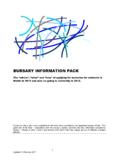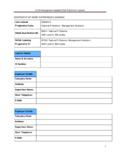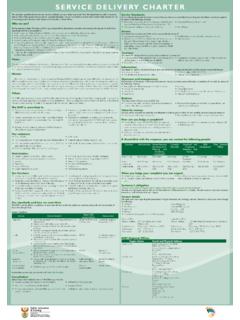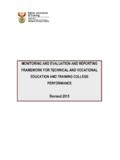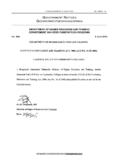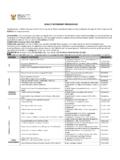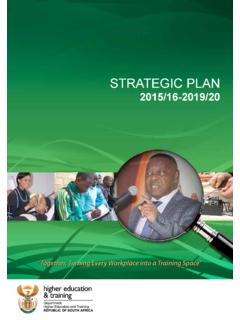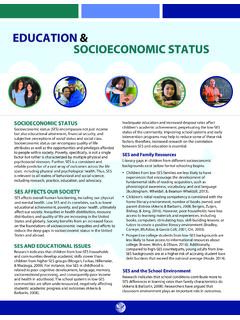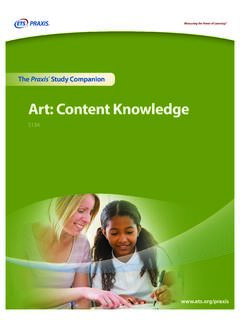Transcription of MINIMUM ADMISSION REQUIREMENTS - Department of …
1 MINIMUM ADMISSION REQUIREMENTS for Higher Certificate, Diploma and bachelor s Degree Programmes requiring a National Senior Certificate Pretoria August 2005 SCHEDULE MINIMUM ADMISSION REQUIREMENTS For Higher Certificate, Diploma And bachelor s Degree Programmes Requiring A National Senior Certificate 1. Introduction Higher Education Institutions currently provide qualifications in terms of the following policies: A Qualification Structure for Universities in South Africa NATED Report 116 (99/02) General Policy for Technikon Instructional Programmes NATED Report 150 (97/01) Formal Technikon Instructional Programmes in the RSA NATED Report 151 (99/01) Revised Qualifications Framework for Educators in Schooling, in Norms and Standards for Educators (Government Gazette No.)
2 20844, February, 2000) The Education White Paper 3, A Programme for the Transformation of Higher Education (1997), proposed a single qualifications framework for higher education. In this regard, a unitary higher education qualifications framework will replace the above policies. The purpose of this policy is to provide for a policy on the statutory MINIMUM ADMISSION REQUIREMENTS in terms of the National Senior Certificate, whose specifications were approved by the Minister of Education in the National Senior Certificate A qualification at level 4 on the National Qualifications Framework, Government Gazette, Vol. 481, No. 27819, July 2005, for undergraduate higher education qualifications and programmes, namely the Higher Certificate, Diploma and bachelor s Degree.
3 The National Senior Certificate will first be issued in 2008. Students entering higher education in 2009 must therefore meet the REQUIREMENTS of this policy. The policy will be implemented from 1 January 2009. 2. Policy considerations The Higher Education Act, 1997 ensures that policies of higher education institutions, including admissions policy, must be formulated with due regard for its relationship to and influence on education and training in other sectors. Institutions admissions REQUIREMENTS , policies and practice are expected to advance the objectives of the Higher Education Act, 1997 and the National Qualifications Framework and must be consistent with the Minister s policies in terms of the Act.
4 In particular, such REQUIREMENTS , policies and practices are expected to advance the objectives of redress, equity and quality in higher education. 3 Consequentially, this policy outlines the statutory MINIMUM or threshold norms for ADMISSION to the undergraduate Higher Certificate, Diploma and bachelor s Degree programmes. Such norms will apply to all public and private higher education institutions. While this policy outlines the statutory MINIMUM ADMISSION to higher education as the National Senior Certificate, the setting of the ADMISSION REQUIREMENTS is made in terms of section 74 of the Higher Education Act and section 16(7) of the General and Further Education and Training Quality Assurance Act by Higher Education South Africa (HESA), being the successor to the South African University Vice-Chancellors Association (SAUVCA) and the Committee of Technikon Principals (CTP).
5 In this regard, I am hereby recognising HESA as the body to set the MINIMUM ADMISSION REQUIREMENTS for the Higher Certificate, Diploma and bachelor s Degree Programmes requiring a National Senior Certificate. Although the National Senior Certificate is the primary gateway between school and higher education, it does not guarantee a learner's ADMISSION to any programme of study in higher education. Within the context of this policy, the right of higher education institutions to set specific ADMISSION REQUIREMENTS to particular programmes is confirmed in terms of section 37 of the Higher Education Act. Many adult learners who have not achieved a National Senior Certificate or equivalent qualification can benefit from higher education.
6 In keeping with the objectives of the National Qualifications Framework the Ministry of Education supports wider and more diverse access to higher education and fairer progression pathways within the system. As at present, institutional ADMISSION policies must allow for alternative routes of entry that are equivalent to the National Senior Certificate standard, including the assessment of an adult learner s capacity to benefit from a particular programme by the Recognition of Prior Learning (RPL) or other means. This document does not otherwise prescribe such alternative routes. 3. Recognised National Curriculum Statement Subjects The subjects listed in the appendix to this document are recognised National Senior Certificate subjects for the purpose of this policy.
7 All recognised subjects have a credit value of 20, except Life Orientation (10). The common basis of ADMISSION to a Higher Certificate, Diploma or bachelor s Degree is the achievement of a National Senior Certificate according to the rules of subject combination prescribed in the policy for the National Senior Certificate A qualification at level 4 on the National Qualifications Framework, Government Gazette, Vol. 481, No. 27819, July 2005. Qualifications in higher education are designed to have high social and economic value to the country. They also represent significant learning achievement, but all qualifications are not alike.
8 They make different intellectual demands and reflect different intellectual achievements on an increasing scale of difficulty, and this is 4 reflected in the different REQUIREMENTS for ADMISSION to the Higher Certificate, the Diploma and the bachelor s Degree, in terms of the National Senior Certificate. The MINIMUM ADMISSION REQUIREMENTS for the bachelor s Degree are therefore particularly distinctive. They balance a number of important considerations. The bar must be set high enough to fairly reflect the cognitive demands that will be made on degree students but not to undermine the important objectives of equity and wider access. Higher education institutions admit applicants who are likely to succeed in degree studies, given good teaching, good facilities and appropriate academic and other support, so the ADMISSION REQUIREMENTS must as far as possible predict student success in the programmes for which they are enrolled.
9 In turn this means that the National Senior Certificate curriculum followed by aspiring degree candidates must equip them to meet the demands of degree studies. The National Senior Certificate has to cater for the minority who aspire to degree study as well as those who will enter vocational higher or further education programmes or the world of work. Some subjects are designed to serve all those purposes and some are designed especially for learners who aspire to enter vocational preparation or employment. For these reasons learners who aspire to degree study will be expected to perform satisfactorily in at least four subjects chosen from a designated list of recognised National Senior Certificate subjects.
10 The list comprises NSC subjects that, when chosen as part of a complete National Senior Certificate programme, are expected to prepare learners well for the demands of first time degree studies. The designated list will remain in place for three years from the commencement of the policy, during which time Umalusi and the Higher Education Quality Committee of the Council on Higher Education, working together with the Department of Education and higher education institutions, will be requested to undertake an evaluation of its suitability and influence. The matter will then be reviewed in the light of the evidence. All recognised NSC subjects, whether they are on the designated list or not, have value in their own right.
